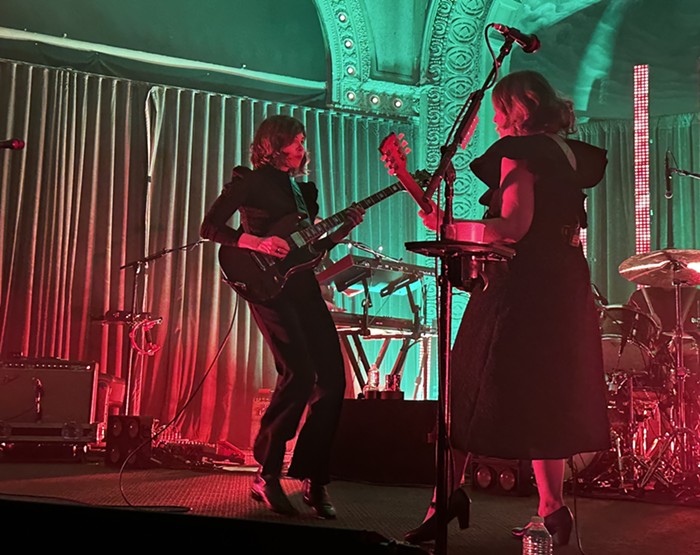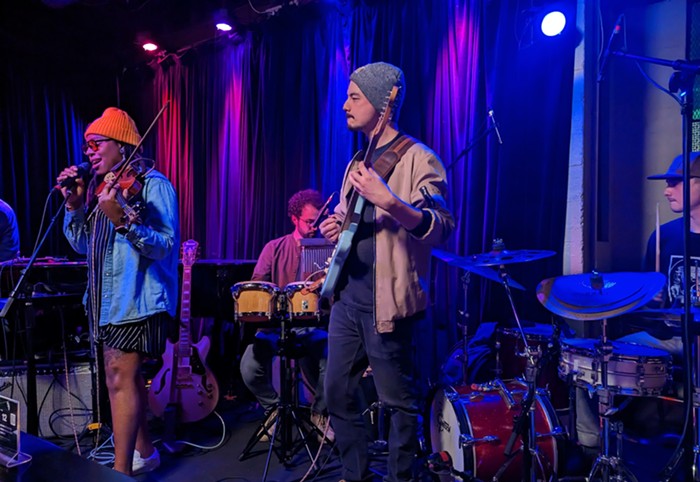There are many curiosity-piquing tidbits to know about 31-year-old Leslie Feist: that she sang with Broken Social Scene; that her boyfriend, Kevin Drew, is Broken Social Scene's main songwriter; that her best friend (and once roommate) is crude performance artist Peaches; and that she recently went from Toronto indierock darling to internationally-acclaimed solo artist.
But listening to her new album, The Reminder, all that seems to matter amid the media's cacophonous chatter is one thing: that voice. Because without that beautifully seductive voice, so effortless and innocent, nothing else does. Feist's endlessly powerful voice holds center stage throughout the pop gem that is The Reminder, hovering, exposed and fragile, above gentle strings and electronics, folk brooding and pop hooking. With each subsequent listen to The Reminder—surely one of the best albums of 2007 (and likely beyond)—it becomes more and more evident that Feist has the sort of voice people want to talk about.
Around the turn of the century, Feist posted a collection of raw demos, called, aptly enough, The Red Demos, on the internet, igniting cult-like appeal. Writing songs between tours with Peaches—with whom she rapped, sang, and puppeteered on stage as Bitch Lap Lap—and Canadian keyboardist Gonzales (also known as Jason Charles Beck), Feist struggled to assume her own identity. Gonzales suggested she try covering songs; maybe she could find herself through them.
And so in 2002 and 2003, Feist and Gonzales recorded songs by the Bee Gees and Ron Sexsmith, among others, in a Parisian studio, mixing in a handful of Feist's originals, including the hit "Mushaboom." The result was Let it Die, which received international radio airplay and a healthy dose of critical esteem.
While Let it Die is wonderful, The Reminder is exceptionally so. Where Let it Die shows Feist's collaborative and interpretive strengths, The Reminder reveals her originality, heart, and soul.
Opening with a bossa nova apology ("So Sorry"), The Reminder feels almost entirely introspective, as she touches lightly—without reading like a diary entry—on relationship revelations ("I'll be the one who breaks my heart," she confides on "I Feel it All"), loneliness and nostalgia ("With sadness so real that it populates/the city and leaves you homeless again," she coos on "The Park"), and more revelation: "I know, I know, I know/that I can only save me," she understands on "The Limit to Your Love." If there's any consistency in theme, it seems centered around Feist finding herself through relationships, not because of them.
The majority of The Reminder was recorded at a mansion in Paris. Her touring bandmates played together in a room without headphones, making for sparse recordings that were essentially captured live. Other tracks, however, were overdubbed with electronic tinkering. The antiquated and modern approach made way for an album that is at times raw and folk-y and, at other times, melodic and beat-driven, all of which are powered by Feist's striking, spine-tingling voice that breathes, rises, falls, and breaks into vibrato with grace and beauty. Everyone's talking about Feist. They should really pause and just listen.


















